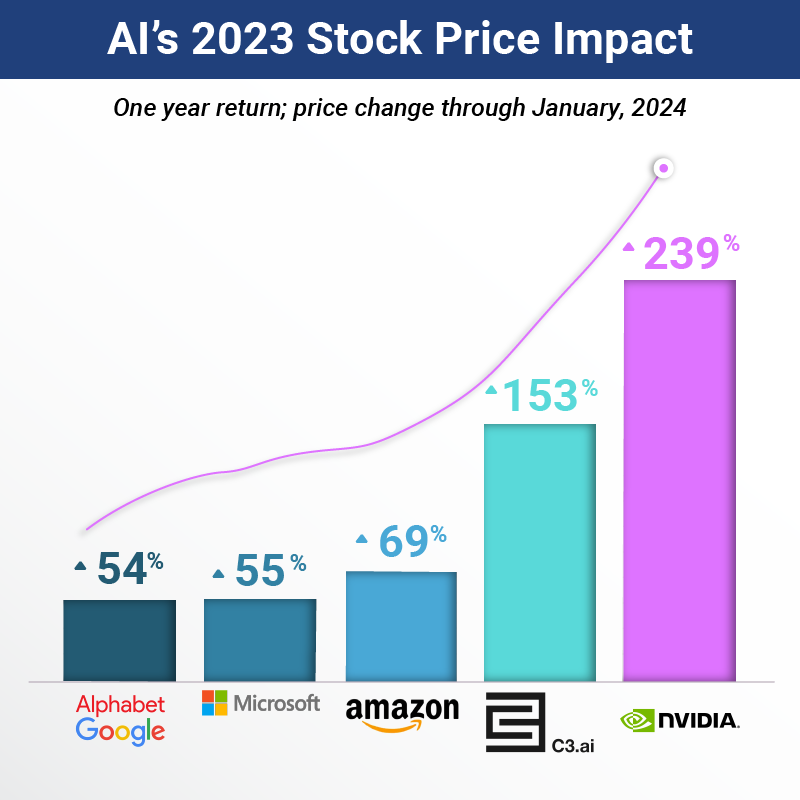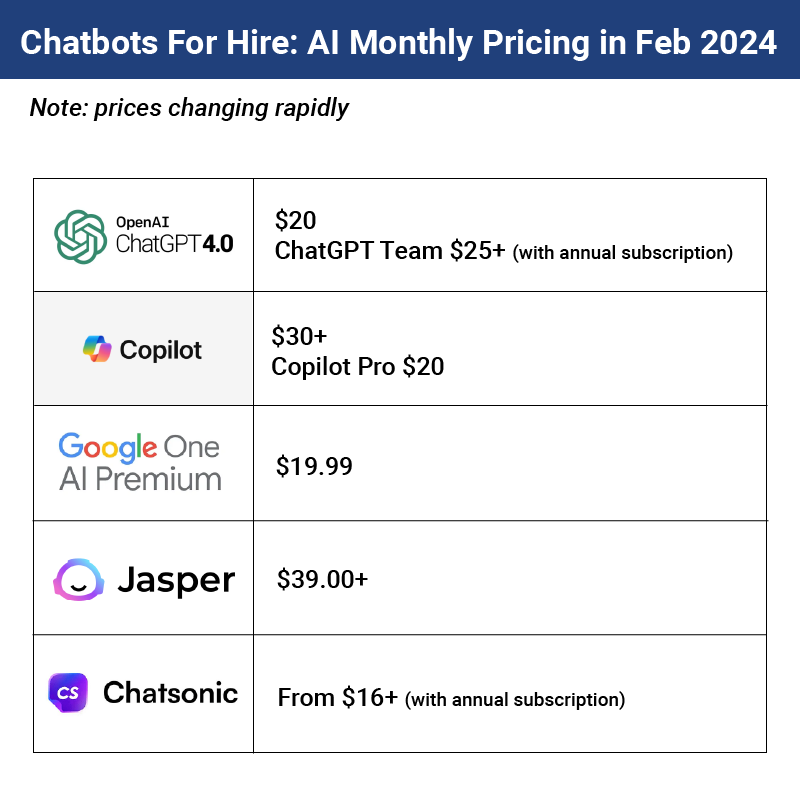On Thursday, February 22nd, Nvidia shattered a Wall Street record by adding $277 billion in value in just a single day. This gain alone would make Nvidia the 37th largest company on the S&P 500 (ahead of Coca-Cola), the 16.4% stock jump coming after the company reported nearly a full year’s worth of earnings in a single quarter.
Nvidia’s meteoric rise to the top of the charts is an indicator of how much the tech industry has changed over the last few months alone and the crucial part AI has to play in this change. Which is why, starting today, we’re launching a new bi-monthly edition of the PTP Report called AI Roundup, where we report on all the major AI-related events that take place over a two month period. We hope to keep you informed and entertained on all the significant AI news and trends, and give you the insights you need to make better decisions on your journey of digital transformation.
[For our 2023 AI roundup, check out this PTP article.]
As we come to the end of February, we see the AI financial surge of 2023 continues into 2024, with little signs of letting up. In our first AI roundup we’re looking at Wall Street, multimodality, data defenses, AI lawsuits and regulation, Davos talks, monthly fees and massive power needs, Nvidia and the chip-making race, delivery hardware innovations, and rampant scams— covering intriguing developments in the constantly-changing world of AI.
Since AI’s now ubiquitous, let’s begin with a few updated usage statistics and a look at the continuing stock market impacts.
A Look at Usage in 2024
OpenAI says 100 million people use ChatGPT every week, while their website (openai.com) gets 1.5 billion visits a month.
It’s probably no surprise that, like many emerging technologies, AI adoption is happening fastest among younger demographics, per Salesforce:
- 70% of Gen Z is using AI (with 52% saying they trust it to help them make decisions)
- 68% of the people who don’t use it are Gen X or older
- 75% of genAI users are trying to automate work tasks
Updated Market Impact
Speaking of work, if 2023 was the year AI triggered stock surges as it launched into the mainstream, analysts expect 2024 to be the year companies want results showing on their bottom line.

Driven largely by its promise, genAI triggered a 2023 Wall Street boom for AI-embracing Big Tech and startups alike.
Many feared this would be an overheated bubble that would soon burst: consider, for example, how Buzz Feed saw its stock surge more than 85% in one day, all from announcing a partnership with OpenAI.
But so far in 2024, the trend continues. In mid-February, Nvidia became the fourth largest company in the world, surpassing both Google and Amazon, largely on the strength of its AI chips (see below for more on the changing AI chip race) and as discussed above, one week later the company set the single–day record for gain on the basis of their stunning earnings over the past quarter.
Sudden share spikes are also still happening for lesser-knowns, like Arm Holdings. Its price more than doubled from February 7–February 12, partly on investments by Nvidia and AI-driven comments by CEO Rene Haas.
As 2024 continues, one question will be which of these surges stick (or keep going), and which burst, if AI systems fail to deliver on expectations.
Leadership and Regulation
The AI Lawsuits Continue
By the end of 2023, several high-profile plaintiffs had brought suits against AI companies, including the New York Times (suing Microsoft and OpenAI), major music publishers (vs Anthropic), actors like Scarlett Johansson, and a trade group for authors like John Grisham, Jonathan Franzen, Jodi Picoult, and George RR Martin.
This continues in the first two months of 2024, with various artists and the estate of George Carlin joining in, as in many cases, judges are refusing requests to dismiss.
Efforts are also underway by companies like OpenAI to lock up content legally, with deals struck with providers like Axel Springer (Politico, and Business Insider) and the Associated Press.
There’s also a push (such as by nonprofit Fairly Trained) to create an AI certification that shows when content is copyright-compliant.
Other Ways Emerge to Protect Against Scraping
Outside of court, tools like AntiFake (scrambles audio signal) and Nightshade (scrambles visual images) are popping up to help people protect their work, and privacy, from being used in AI training without their permission.
The service Kudurru creates a blacklist of IP addresses that are scraping internet data and lets clients not only block these, but also send back unwanted content (like rude gestures, or the Rick Astley video “Never Gonna Give You Up”).
While this cat-and-mouse game continues to shift, new tools pop up and adjust, as another component in the fight for consent in AI training.
Government Regulation Continues to Roll Out
Check out this PTP article for a look at initial AI regulations, like the EU AI Act, and the US government’s executive order. So far in 2024, the EU AI Act has been approved and sent to the European Parliament, continuing its progress to adoption.
In the United States, California is considering a bill now (the “Safe and Secure Innovation for Frontier Artificial Intelligence Systems Act”) that would create a statewide AI unit. With many prominent tech firms located in the state, the bill aims to require major AI systems to include emergency cut-offs and hacking protections.
The US government, meanwhile, created an AI safety advisory group (the US AI Safety Institute Consortium, or AISIC) within the National Institute of Standards and Technology (NIST), including the participation of organizations like Carnegie Mellon and Duke Universities, Amazon, Apple, Google, Microsoft, and OpenAI.
The World Economic Forum Focuses on AI
This year’s World Economic Forum in Davos, Switzerland, took place January 15–19th, and was headlined by AI, another mark in the technology’s increasing importance.
The big AI stars were in attendance, and numerous panels presented on the technology.
As pricing plans and genAI business integration begin to hit their stride, debate continued on how best to monetize the technology and whether 2024 could see an AI letdown if bottom lines aren’t directly impacted.
Topics considered included the coming impact on employment and productivity (and how best to prepare workers), the need for responsible governance, and how enterprise software makers and large-scale tech companies appear to be winning the race so far.

If 2023 was the year genAI emerged for everyone to try, 2024 is the year we begin to pay for it.
AI Hardware Innovations
Sustainable Tech vs AI’s Power Drain
Studies results released late in 2023, like this one from Carnegie Mellon University and AI startup Hugging Face, began to dive into the surprising energy demands of genAI, with image generation topping their list of findings.
As reported in the MIT Technology Review, generating a single AI image can use as much power as charging your phone.
Training is also demanding: the GPT-3 used only for drug trials required as much as 1.287 gigawatt hours of power, or the amount used by 120 homes in the US over an entire year.
As AI use accelerates, it’s estimated that machine learning systems alone could consume nearly all the world’s current energy production by the year 2040.
With these sobering facts paired with a growing emphasis on sustainable technology, 2024 sees a drive at making AI more energy efficient.
Researchers hope that, as a new innovation, we’re seeing the least efficient AI possible, and that by harnessing AIs own capacity to solve problems it will become radically more efficient.
Chips
With a market expected to double by 2027 (to $140 billion), making the chips for AI use is a booming business.
Nvidia is the hands-down master of the GPUs needed for AI, providing more than 70% of all AI chip sales. This is one primary reason they’ve grown so rapidly over the past year (adding more than a trillion dollars in valuation), with sales up more than 200%.
But even aside from costs, concerns are growing over the difficulty of moving between different kinds of chips, with the software currently specific to the kind used.
With a cornered market and a cost often more than $15,000 per chip, 2024 is seeing a number of other large AI players—Amazon, Google, Meta, and Microsoft—all committing substantial resources to get into the field.
- Amazon’s investment of $4 billion in Anthropic includes a commitment by Anthropic to use chips designed by Amazon, such as the AWS Trainium. The massive online seller has reportedly spent $200 million to make 100,000 of its own.
- Google has already spent between $2–3 billion dollars on its chips, which reportedly cost far less ($2-3,000 per) than Nvidia’s.
- Microsoft and Amazon are both working on chips that are easy to move between, aiming for a more open market in the future.
- OpenAI’s Sam Altman in mid-February is working with the US government for approval for an international deal he aims to be worth more than $7 trillion (more the value of AMD, Nvidia, and Intel combined) aimed at remaking the global AI chip industry.
Chips have also been in the news in 2024 as limitations on the hardware are considered. In January, the Center for Naval Analyses proposed this very solution, called “On-Chip Governance.” These solutions aim to monitor, restrict growth, and control privacy issues at the hardware level.
AI Away From Phones and PCs
A number of hardware startups aiming to provide unique ways to use AIs were first formed in 2023, and many have started showing their work in 2024, such as at the January Consumer Electronics Show (CES) in Las Vegas.
Work continues expanding in this arena, including:
- LoveFrom, founded by Apple designer Jony Ive, added Apple iPhone and Apple Watch design executive Tang Tan in February, for work on a new AI hardware project reportedly in collaboration with OpenAI’s Sam Altman.
- Software Applications Incorporated was formed by three more ex-Apple employees, including CEO Ari Weinstein who sold a prior startup to Apple. Their work rethinks current operating systems with AI in mind.
- Robotics platform maker Integrit rolled out a genAI-using hardware called Stella that interacts with customers in high-volume environments, reportedly recognizing customer movements in addition to responding to dialog.
- Chinese electronics company Meizu, which has made Android phones for more than 10 years, announced in late February they are moving out of smartphones and into AI devices.
- The Rabbit R1 “AI companion” was one of the big gadgets at CES and sold 10,000 units on its first day. Responding to voice and touch, it’s an AI-dedicated device that allows web searches and media control using AI.
New Versions of Existing Things
Multimodal AI
2024 may be “the year of Multimodal AI” with Google’s Gemini being integrated into Android smartphones and across Google tools, and OpenAI starting to allow developer access to GPT-4V.
Multimodal AIs are trained across various data types (such as taking video, images, and text) and may also output across varying types.
Check out this PTP article (Seeing is Believing: The Multimodal AI Evolution) for an in-depth look at multimodal AI!
They’re Called GPTs Now
Chatbots are rampant, with so many out there it’s hard to tell them apart, many built on the same handful of AI models.
As of February 2024, these included: Copilot, ChatGPT, Claude, Perplexity.ai, Jasper, YouChat, Chatsonic, Gemini (formerly Bard), Socratic, HuggingChat, Lyro, Drift, Ada, Zoho, Pi, Poe, Replika, Elomia, Kasisto, MedWhat, Wati, Infeedo, Paradox, Mobile Monkey, DialogFlow, ChatSpot, and oh so many more!
OpenAI rolled out their OpenAI Store in January for what they call “GPTs,” or customed chatbots users can make with GPT-4, as subscribers.
GenAI Revolutionizes Scams, Too
Not surprisingly, 2024 has seen a rise in AI-crafted shenanigans and cybercrime, including scams such as:
- Fake Recruiters: Microsoft confirmed that North Korean operatives are posing as LinkedIn recruiters with the help of ChatGPT.
- Zombie Sites: Established websites with lapsed domains (such as thehairpin.com) are rapidly being located and turned into zombie sites, often with AI-generated riffs on original content, using AI-generated portraits for fake authors.
- Obituary Pirates: Scammers are using AI to generate websites and YouTube videos, built from scraped obituaries, with the purpose of stealing clicks driven by search engine traffic.
- Romance Scams: Surging around Valentine’s Day, scammers are creating fake profiles to lure in users, which dating sites are increasingly having to weed out and guard against.
- Fake Books and Facsimiles: AI-generated imitations and summaries of real books are being sold en-masse on Amazon (sometimes even before the actual books arrive, based on advanced copy).
- Fake Callers: Phone scams using AI-generated voice content are increasingly common, but were also made illegal by the FCC on February 8th, weeks after imitations of President Biden’s voice were used by robocalls in New Hampshire.
Conclusion
2024 may be only two months old, but already there’s too much to cover in the rapidly-changing world of AI. This article’s taken a look at some of the more noteworthy/interesting developments of January and February.
Keep your eyes out for our next installment in April, covering events in AI since February!





